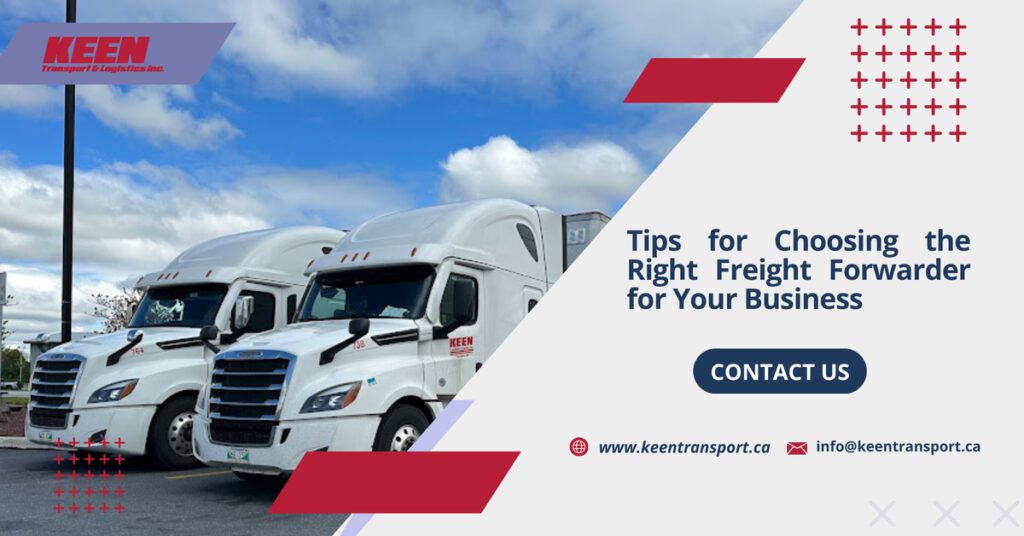In the complex world of international trade and logistics, choosing the Right freight forwarder is crucial for ensuring smooth and efficient supply chain operations. A reputable freight forwarder acts as a key partner, managing the transportation of goods from origin to destination, navigating customs procedures, and ensuring timely deliveries. Here are essential tips to help you select the right freight forwarder for your business needs:
Assess Industry Experience and Expertise
Begin by evaluating the freight forwarder’s industry experience and expertise. Look for a company with a solid track record in handling shipments similar to yours. Experienced freight forwarders understand the nuances of international logistics, including customs regulations, transport routes, and documentation requirements. Their expertise can help navigate potential challenges and ensure seamless operations.
Verify Licensing and Accreditation
Ensure that the freight forwarder is licensed and accredited by relevant authorities. Accreditation from industry associations such as FIATA (International Federation of Freight Forwarders Associations) or IATA (International Air Transport Association) indicates compliance with industry standards and ethical business practices. Licensed freight forwarders are equipped to handle international shipments legally and professionally.
Evaluate Services Offered
Review the range of services offered by the freight forwarder. A comprehensive freight forwarder should provide end-to-end logistics solutions, including:
- Freight Forwarding: Managing the movement of goods via air, sea, rail, or road.
- Customs Brokerage: Handling customs clearance and ensuring compliance with import/export regulations.
- Cargo Insurance: Offering insurance coverage to protect shipments against loss or damage.
- Warehousing and Distribution: Providing storage facilities and managing distribution networks.
- Value-added Services: Such as supply chain management, inventory management, and vendor management.
Choose a freight forwarder that aligns with your specific logistical requirements and offers tailored solutions to meet your business needs effectively.
Check Network and Global Reach
Assess the freight forwarder’s global network and reach. A well-established network of agents and partners worldwide facilitates efficient transportation and customs clearance in diverse markets. A robust global presence ensures reliable service delivery, minimizes transit times, and reduces the risk of delays or disruptions. Partnering with a freight forwarder with extensive global reach enhances your logistics capabilities and supports your business’s growth objectives.
Technology and Tracking Capabilities
Select a freight forwarder that leverages advanced technology for shipment tracking and visibility. Real-time tracking systems and logistics management software provide critical insights into shipment status, location, and estimated delivery times. Enhanced visibility enables proactive management of logistics, allowing for timely interventions and adjustments to optimize supply chain efficiency. Discuss the freight forwarder’s technological capabilities, such as GPS tracking, electronic data interchange (EDI), and mobile applications, to ensure seamless communication and transparency throughout the shipping process.
Consider Industry Specialization
Consider whether the freight forwarder specializes in handling specific industries or types of cargo. Specialization in sectors such as pharmaceuticals, perishables, automotive, or hazardous materials indicates expertise and tailored solutions to meet industry-specific requirements. Industry-specific knowledge ensures compliance with regulatory standards, addresses unique logistical challenges, and enhances service reliability. Choose a freight forwarder with demonstrated experience in your industry to benefit from specialized insights and optimized logistical solutions.
Customer Service and Support
Evaluate the freight forwarder’s customer service and support capabilities. Effective communication, responsive customer support, and proactive problem-solving are essential for a positive logistics experience. Assess the freight forwarder’s availability, responsiveness during emergencies, and willingness to address inquiries or concerns promptly. A customer-centric approach fosters trust, enhances collaboration, and ensures seamless coordination throughout the shipping process. Prioritize freight forwarders known for exceptional customer service and a commitment to delivering superior logistics solutions.
Pricing and Cost Transparency
Compare pricing structures and cost transparency among freight forwarders. Request detailed quotations that outline freight rates, surcharges, insurance costs, and any additional fees. While cost is a critical factor, prioritize value and service quality over the lowest price. Consider the freight forwarder’s reliability, track record, and ability to deliver consistent and cost-effective logistics solutions. Transparent pricing ensures clarity and helps avoid unexpected expenses or financial risks associated with shipping operations.
References and Reviews
Seek references and reviews from previous clients to gauge the freight forwarder’s reputation and performance. Online reviews, testimonials, and case studies provide valuable insights into customer satisfaction levels, service reliability, and adherence to delivery schedules. Positive feedback and testimonials from satisfied clients indicate a freight forwarder’s credibility, professionalism, and ability to meet or exceed expectations. Choose a reputable freight forwarder with a proven track record and positive industry reputation to ensure reliable and efficient logistics management.
Compliance with Regulatory Requirements
Ensure that the freight forwarder complies with international trade regulations, customs procedures, and security protocols. Verify their knowledge of import/export regulations and their ability to handle documentation accurately and efficiently. Compliance with regulatory requirements minimizes risks of customs delays, penalties, or shipment seizures, ensuring smooth and lawful transportation of goods across borders. Partnering with a compliant freight forwarder mitigates regulatory risks and supports your business’s adherence to legal and operational standards.
Conclusion
Choosing the right freight forwarder is a strategic decision that impacts your business’s logistical efficiency, cost-effectiveness, and overall competitiveness in the global market. By considering these essential tips and conducting thorough due diligence, you can confidently select a freight forwarder that aligns with your business objectives and operational requirements. A reliable freight forwarder acts as a trusted partner, facilitating seamless supply chain management and contributing to your business’s success and growth.

